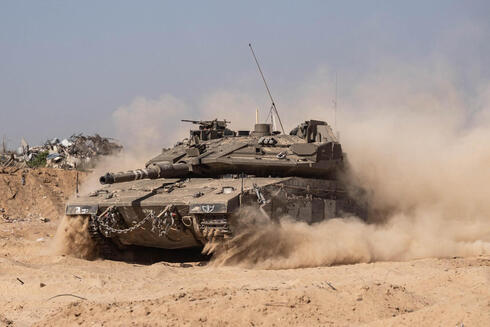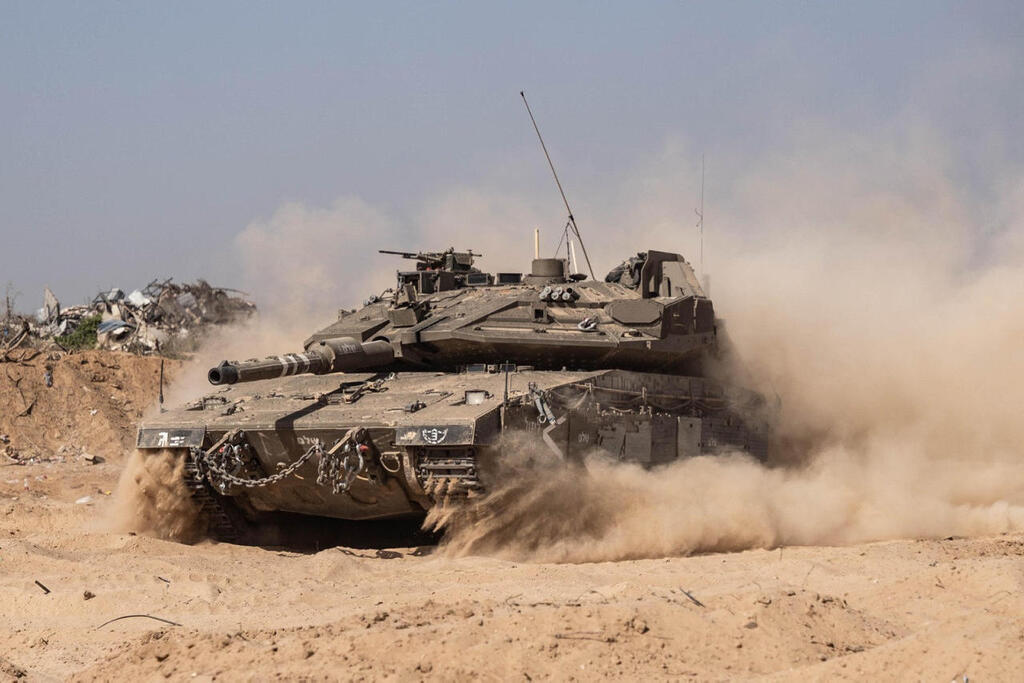
Israel grapples with ammunition shortage amid global arms restrictions
Israel's defense industry is struggling to meet ammunition demands as several countries halt arms trade and raw material supplies. The Ministry of Defense and IDF are urgently seeking to bolster local production despite the higher costs and logistical challenges.
"If we have to stand alone, we will stand alone. If necessary, we will fight with our nails," declared Prime Minister Benjamin Netanyahu two months ago amid the growing disagreements between the Israeli government and the Biden administration. A month later, Netanyahu raised the stakes and made public what had been said behind closed doors: "It is unacceptable that the U.S. is delaying arms shipments to Israel," he proclaimed in English in a video posted on social media.
While the complicated relations with the U.S. over aid to Israel has dominated public attention, the Ministry of Defense and the IDF are currently worried about another emerging threat: the possibility of a shortage of ammunition after several countries have unofficially stopped trading with Israel. Calcalist has learned that arms suppliers from European countries have simply stopped responding to their Israeli counterparts, and that a foreign power other than the United States that previously traded with Israel has refused to supply Israel with raw materials from which ammunition can be manufactured since October 7.
According to a report by The New York Times, the IDF is facing a shortage of 120 mm shells for tanks such that some tanks stationed in Gaza are now on partial alert and carry a smaller amount of shells in case of a flare-up on the northern border. Calcalist learned from senior IDF officials that there is indeed an "armament economy." The New York Times reported that the army is also facing a shortage of spare parts for tanks, D9 bulldozers, armored personnel carriers and other light ground ammunition.
The primary solution the defense establishment is promoting to address the ammunition shortage is to advance the local industry and reduce reliance on imported shells and ammunition from foreign countries. This move is expected to positively impact the Israeli defense industry but will also have negative economic consequences: the ammunition produced in Israel is considered to be tens of percent more expensive than what can be imported from abroad, and both building and maintaining "simple" ammunition factories that produce, for example, artillery and tank shells are considered particularly costly. There are also additional implications: among other things, this need is expected to delay the evacuation of the IMI (Israel Military Industries) compound in Ramat Hasharon, to allow Elbit to continue producing ammunition there, as reported a month and a half ago by Calcalist.
Despite the understandable attempt to strengthen the local industry and thus reduce dependence on the world, those who believe that Israel can produce all the ammunition it needs on its own will be disappointed. First of all, even in the case of a massive increase in Israeli production capacity, a significant portion of the ammunition will still have to come from foreign countries in any scenario due to limited production potential. Even the U.S. is struggling to supply itself and its allies, including Israel and Ukraine, with all the shells they need. Secondly, in order for the Israeli defense industries to produce weapons materials in large quantities, a large amount of raw materials from which bombs can be manufactured is needed, which cannot be mined in Israel and must ultimately be imported.
As mentioned, besides the unofficial embargo imposed by some suppliers on the sale of ammunition to Israel, Calcalist learned that major suppliers of raw materials used to manufacture bombs have also stopped selling to Israel since the war broke out. The defense establishment's solution to this embargo is to diversify suppliers, purchase in advance stockpiles of raw materials that will be used in the future for bomb production, and create huge reserves of raw materials in Israel. The fact that the IDF and Ministry of Defense are directly involved in this issue is unusual, and in the past, the defense industries used to secure raw materials for themselves without direct involvement from the military and political echelons.
Since the war broke out, there have been more and more reports of countries and companies seeking to reduce or restrict defense trade with Israel. Among other things, there have been reports of issues with the supply of F-35 spare parts from Dutch suppliers; the governments of Italy, Canada, and Belgium have announced the cessation of defense exports to Israel (despite reports of shipments continuing to arrive and deals continuing to be signed); and the Spanish government even prevented a ship carrying an arms shipment from India to Israel from docking in its ports.
The shipment that was prevented from stopping at the Spanish port of Cartagena is reported to have contained 27 tons of explosives from India. This case illustrates Israel's strategy of diversifying sources: India, which is the number one importer of Israeli defense exports, has now also become a supplier of defense raw materials and even of weapons to Israel.
On the positive side, Calcalist learned that another country has started selling raw materials used by the Israeli defense industry, and according to other reports in the media, Serbia has provided a defense airlift to Israel since the war broke out.
Besides the political context that complicates the defense establishment's efforts regarding defense imports, there is also a global economic context. The increased use of ammunition in the wars in Gaza and Ukraine has led to an unusual global shortage of ammunition of all types, which has led to rising prices and increased competition among countries for ammunition and raw materials. Already in January, Calcalist reported that the IDF had to manage its bombing pace due to the global shortage and the intensive use of ammunition at the beginning of the operation. At the end of November, less than two months after the war started, the IDF announced that the artillery corps had used more than 100,000 shells.














